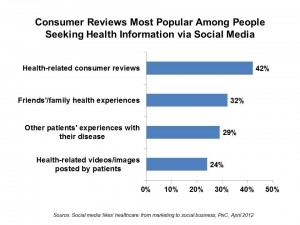 One in 3 Americans uses social media for health discussions. Health is increasingly social, and PwC has published the latest data on the phenomenon in their report, Social media ‘likes’ healthcare: from marketing to social business, published this week.
One in 3 Americans uses social media for health discussions. Health is increasingly social, and PwC has published the latest data on the phenomenon in their report, Social media ‘likes’ healthcare: from marketing to social business, published this week.
PwC polled 1,060 U.S. adults in February 2012 to learn their social media habits tied to health. Among all health consumers, the most common use of social media in health is to access health-related consumer reviews of medications or treatments, hospitals, providers, and insurance plans, as shown in the graph.
Social media enables people to be better health “consumers” by giving them peers’ views on health products and services. Notably, PwC found that 45% of consumers said information found via social media affects their decision to seek a second opinion from another doctor — this, above the 42% of people who use social media to help them cope with chronic conditions, diet, exercise or stress management. Furthermore, 41% of people said information they find via social media helps them choose a specific hospital or physician. And — listen up, pharma and medical device companies, along with health insurance plans — one-third of people said social media influence their decisions about taking certain medications or undergoing specific procedures, or selecting a health plan.
Social media also helps people manage personal health administration, such as making appointments, getting appointment reminders, referrals, and discounts for services (think: Groupon for dermatology), customer service, and determining wait times at emergency rooms.
The report features examples of health industry segment leaders who are successfully engaging in social health, such as Aetna. The health plan offers Life Game, an online social game that engages people in setting and working toward personal wellness goals. What’s notable about this is that health plans haven’t historically been trusted by consumers to get up-close-and-personal with their health. But as health consumers look for useful and well-designed online tools, the health industry can build bridges for both health and trust.
Physicians are still the most trusted touchpoint across health industry segments, when it comes to people sharing information via social media, compared to hospitals, health plans, and drug companies. While 61% of health consumers trust information coming from doctors via social media, and 41% would be likely to share information with doctor, this drops to 55% and 39% vis-a-vis hospitals, 42% and 34% for health insurers, and 37% and 28% with drug companies.
“Embrace social media as a mindset, not just a channel,” PwC counsels these industry players. Tactically, this means these organizations must not just ‘talk and listen,’ but analyze and integrate the learnings from conversations into insights and actions:
For pharma, PwC recommends moving forward while minimizing regulatory and legal risk in the absence of FDA regulations for social media use. PwC says pharma should “move beyond marketing” by tapping into social networks to populate clinical trials and inform product development and innovation.
For health providers, social media can provide collaborative opportunities for care coordination — and new ways of delivery better quality care at lower costs.
For health plans, social media can drive population health management for newly-insured people looking toward implementation of the Affordable Care Act: for example, aggregating data generated through social networks to inform condition management.
Health Populi’s Hot Points: In a section titled, “A future look,” PwC focuses in on the potential value of patient data generated through social networks. As the U.S. morphs toward performance-based payment – accountable care, writ large – the patient health record must bring together more than traditional claims data. The observations of daily living, from mood to calories taken in and exercise, complement the usual clinical data to provide a 360-degree picture of a person’s health and health behaviors. As U.S. Surgeon General has said, and I frequently quote, health is where we “live, work, play and pray” — not in the doctor’s office. PwC’s discussion on how to integrate social data into the EHR is an important one, which is just beginning to get traction beyond a few of us HIT wonks who have been involved in social media for the past decade. The question is succinctly put by Kevin Abramson of OptumHealth in the report: “How can we use this information to better understand the outcomes we see in the claims data?” To do this, and get to ‘social/health intelligence,’ Abramson’s company OptumHealth, along with many other data aggregators (from Big Data companies to nimble start-ups who “get” slices of clinical/personal health) will drive toward these solutions.
Don’t forget that large numbers of patients aren’t yet sharing on social networks. Even though more consumers are engaging with social media for health, it’s still important to segment the market and provide tools, apps, and services that provide what different consumer groups want. PwC notes that so-called “young invincibles” are more likely to share personal information, and Boomers less so. And less you risk techno-optimism when it comes to social health, note that people over 65 in poor health were least likely to trust, share and engage using social media in the PwC survey. And this cohort represents the most intensive (read: most expensive) users of the health system.
Ultimately, even with the growth of social media, getting the un- and dis-engaged health consumer to re-engage continues to be a challenge for all health systems.





 Grateful to Gregg Malkary for inviting me to join his podcast
Grateful to Gregg Malkary for inviting me to join his podcast  This conversation with Lynn Hanessian, chief strategist at Edelman, rings truer in today's context than on the day we recorded it. We're
This conversation with Lynn Hanessian, chief strategist at Edelman, rings truer in today's context than on the day we recorded it. We're